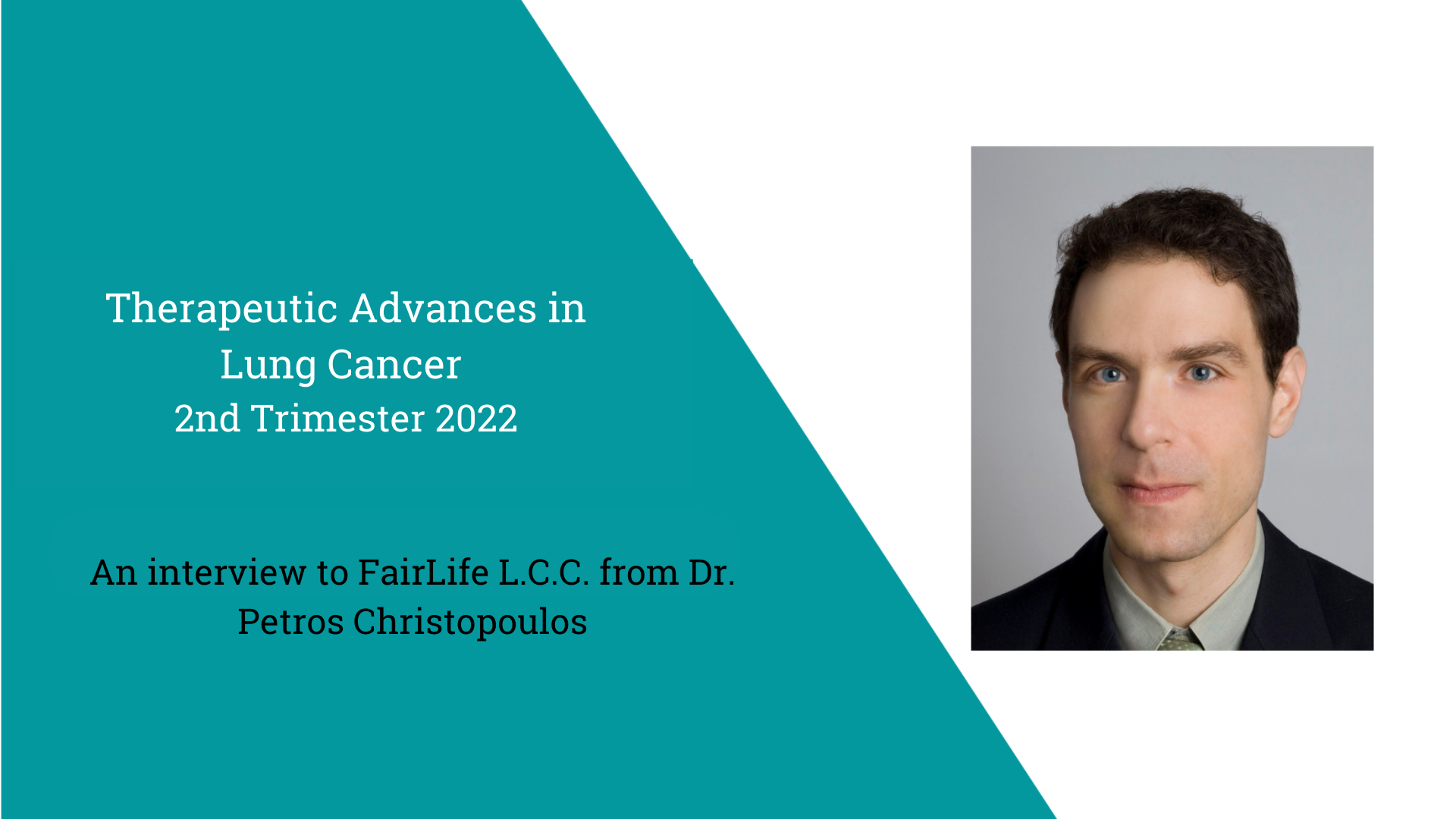Therapeutic Advances in Lung Cancer – 2nd Trimester 2022
Modern thoracic oncology is a highly dynamic field with continuous introduction of new therapies that improve patient survival. Aim of this series is to summarize recent developments of immediate practical interest.
- Approval of Atezolizumab as adjuvant immunotherapy for non-small-cell lung cancer with high PD-L1 expression
On June 9th, 2022, the PD-L1 inhibitor atezolizumab was approved by the European Medicines Agency (EMA) as adjuvant therapy after complete surgical resection and platinum-based chemotherapy for stage ΙΙ-ΙΙΙΑ non-small-cell lung cancer (NSCLC) with PD-L1 expression on ≥ 50% of tumor cells and wild-type EGFR/ALK. The drug is administered intravenously every 3 weeks for one year and reduced the risk of cancer recurrence or death by 57% in the phase 3 IMpower010 trial (3-year relapse-free survival 75% with atezolizumab vs. 50% without). This is a major milestone and represents the first approval of immunotherapy for patients with operable lung cancer in Europe. A significant survival benefit was recently announced for postoperative administration of the PD-1 inhibitor pembrolizumab , as well, in the phase 3 trial Keynote-091, but approval is still pending. Besides, preoperative immunotherapy is also emerging as an alternative option for these patients: as announced at the American Association for Cancer Research (AACR) conference on April 10th, three cycles of the PD-1 inhibitor nivolumab administered preoperatively together with platinum-based chemotherapy reduced the risk of NSCLC recurrence or death after surgical resection by 37% in the phase 3 study Checkmate-816 (2-year relapse-free survival 64% vs. 45% with preoperative chemotherapy alone; for certain subsets, e.g. tumours with high PD-L1 expression, the benefit was even greater). Preoperative chemoimmunotherapy for NSCLC is already routinely available in the USA, while approval by the EMA is expected during the next months.
Ref:
- https://www.thelancet.com/journals/lancet/article/PIIS0140-6736(21)02098-5/fulltext
- https://www.annalsofoncology.org/article/S0923-7534(22)00340-4/fulltext
- https://aacrjournals.org/cancerres/article/81/13_Supplement/CT003/669724/Abstract–CT003-Nivolumab–NIVO–platinum–doublet
- Approval of Selpercatinib as first-line treatment for non-small-cell lung cancer with RET fusion
On June 21st, 2022, the European Medicines Agency (EMA) extended approval of the tyrosine kinase inhibitor selpercatinib as first-line treatment of advanced NSCLC with a RET fusion (detectable in approximately 1-2% of cases). This decision was based on the latest data from the phase II clinical study LIBRETTO-001, which were presented at the European Lung Cancer Conference (ELCC) on April 3rd, 2022 and complements a previous approval of the same drug on February 12th, 2021 after failure of platinum-based chemotherapy or immunotherapy. Selpercatinib is administered orally once daily, generally well-tolerated, and much more active than chemotherapy, causing significant tumor shrinkage (partial remission) in 84% of patients with a median duration of response approaching two years. A second selective RET inhibitor, pralsetinib , is also approved as first-line treatment for the same patients since December 9th, 2021.
Ref:
- https://www.annalsofoncology.org/article/S0923-7534(22)00152-1/fulltext
- https://www.nejm.org/doi/full/10.1056/NEJMoa2005653
- Approval of Capmatinib as second-line treatment for non-small-cell lung cancer with MET exon 14 skipping.
On June 22nd, 2022 the tyrosine kinase inhibitor capmatinib was approved by the European Medicines Agency (EMA) as second -line treatment for patients with metastatic NSCLC harboring MET exon 14 skipping (METΔex14, detectable in approximately 2-3% of cases). It is administered orally twice daily regardless of meals and caused tumour shrinkage in most (52%) patients, as observed in the phase II Geometry-mono-1 study. Tolerability is generally good, with peripheral edema as the main side effect. Capmatinib is the second targeted drug to enter the therapeutic armamenterium for patients with METΔex14-mutated lung cancer, following the recent approval of tepotinib in February 2022 also for second-line use, while further MET inhibitors are in advanced clinical testing.
Ref:
- https://www.nejm.org/doi/full/10.1056/nejmoa2002787
- https://www.annalsofoncology.org/article/S0923-7534(22)00151-X/fulltext
We thank Dr. Petros Christopoulos for granting this interview to FairLife L.C.C.
